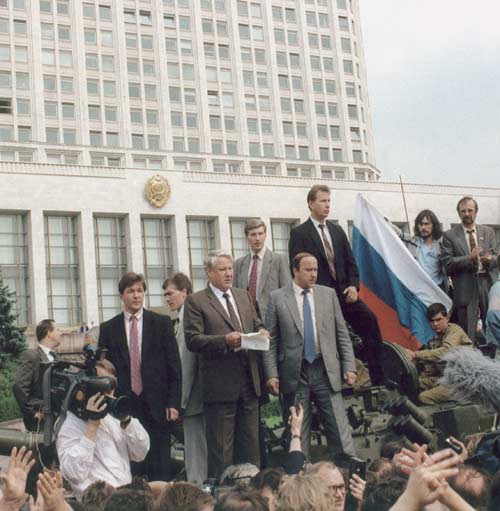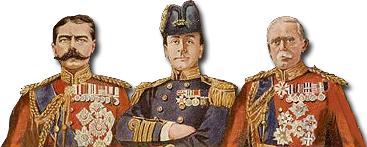Boris Yeltsin, President of the Duma, leads the counter-coup against Tsar Ivan VII, November 29th 1990
World map, 1991:Economic map:Spoiler Alert, click show to read:Debilitating factors in Russia:Spoiler Alert, click show to read:The year is 1991, and the world is about to change once more - not necessarily for the better, either.Spoiler Alert, click show to read:
The Eurasian Empire, that eastern giant governing everything from Sarajevo to Vladivostok and Kamchatka and from Arkhangelsk to Tehran, is coming undone. Nearly two decades of ludicrous military spending, a failed military adventure in Afghanistan, bureaucratic inertia, political corruption, growth in nationalism and/or democratic leanings, and the degeneration of the once-feared Black Hundreds have all come to a head. Tsar Ivan VII Romanov was already forced to make concessions to the public in 1989, permitting the drafting of a Constitution and popular elections for a nationwide Duma - only to go back on his word barely a year later and attempt a coup d'etat against his own parliament, which failed so badly that the Duma's leader, Mikhail Gorbachev, was able to stage a counter-coup and place the imperial family under house arrest.
Now Russia is in a state of chaos. Theoretically still a monarchy, its Tsar now chafes under house arrest in the Catherine Palace of Tsarskoye Selo, and its Duma's powers are tremendous but poorly defined due to said Tsar's interference in the process of writing the Constitution. The Black Hundreds, long feared as the enforcers of state and church, have long since degenerated into a mob of bloodthirsty street thugs and corrupt priests, and were disbanded after the Tsar's failed Coup Attempt of November 1990 - but the Duma has been unable to enforce this order, allowing bands of ex-Black Hundred outlaws to roam the cities and the countryside, terrorizing the population and generally acting like bandits. In the Duma itself, forces of Reaction and Revolution alike have been mobilizing and are intent on forcing an outcome to their liking by word or by blood - and as for Tsar Ivan, he has been far from inactive himself, trying to win the support of the nobility and the Church he once tried to suppress to increase his personal power & wealth and to build a proper powerbase from which he can reclaim absolute authority over the land. Compounding all these problems, these political issues are taking place against the backdrop of economic collapse, radical 'shock therapy' market reforms combined with the rise of corrupt business oligarchs having caused hyperinflation and the degeneration of the average Russian's standard of living, to the point where bread riots are now a common sight even in Moscow and Petrograd.
Meanwhile, nationalist insurrections have resulted in the resurgence of a united Bagratid monarchy in the Trans-Caucasus, the proclamation of an Islamist Emirate of the North Caucasus, the State of Azerbaijan, the Emirate of Kurdistan, the People's Democratic Republic of Turkey, and the rise of the secular Kazakh nationalist 'Alash Orda' and the Islamic Sultanate of Turkestan in Central Asia, all of which have been able to resist Russian attempts to put them down. Polish, Finnish, Baltic and Mongolian nationalists still under the Russian yoke have been encouraged by these so-far successful wars of independence, and are also agitating to break free from Petrograd's hold.
Even family can no longer be trusted: three of the Nikolaevichi princes, descendants of Tsar Nicholas II (1868-1938) seized the opportunity presented by the breakdown of authority in Moscow & Petrograd to declare the independence of three new Balkan states - Greece, Bulgaria and Romania. The Tsar's uncle & the governor of Serbia, a bastard son of his grandfather Georgy, has also declared his dominion's independence from Russia. The three younger princes' attempt to occupy Constantinople, long mercilessly purged of its Muslim inhabitants, nearly ended in all three shooting at each other and anyone else caught in the crossfire, with bloodshed only being averted at the last minute by the intervention of Patriarch Bartholomew. The Patriarch promptly declared the Queen of Cities a 'free city' and allowed a joint garrison of Romanians, Bulgarians and Greeks into the city, and now they reluctantly work alongside the local gendarmerie in maintaining peace, order and the rule of law.
Worsening the situation even further are the two remaining Great Powers, the Imperial Union of Europe and the People's Syndicates of the Americas. The former is a federation of the kings and princes of Europe, all with a strong tradition of the merging of Church and State and of public intervention in every area of one's life, recognizing the suzerainty of the Stuart Emperors in Ravenna and maintaining (at least ceremonially) independent armies, mostly dedicated to the protection or at times the aggressive expansion of the Catholic faith. In addition to their European holdings and vassals, the Stuarts still have a vast overseas empire all bound to the old Anglo-French crown, even if the process of decolonization has robbed them of most of their inner African holdings and yet other loyal colonies elevated to the status of autonomous dominions. The current Stuart Emperor of Europe, Richard II, has matrilineal claims to the Russian throne just like the Balkan kings, and together with his fanatically Catholic Polish nationalist of a wife, the Empress Anna, and his aggressive High Chancellor Viscount Maximilian Sutherland, is already making designs on Russia; already, the Qajar vassals of the Tsars in northern Persia have been swept aside by Imperial forces, and Iran reunited under the rule of Europe's Zand vassals.
Across the ocean, the People's Syndicates of the Americas still stands as the lone bastion of Luciferanism on Earth, ruling everything from Maine to Patagonia. Established at the end of a brutal civil war between the Puritan government of the Columbian Commonwealth and a number of other factions and religions, the Satanists have since expanded to incorporate the rest of South America - and, to the detriment of the multitudes who would like to see them wiped out, have also gotten a nuclear arsenal for themselves. They are renowned for their cruelty, their debauchery and the utter heartlessness of their economic system (termed 'Truism' by the Satanists, 'pure evil' by everyone else) throughout the world, with even the 'Bloody Emperor' Charles I of Europe holding them in great fear and disgust, and though it is not known how many of their atrocities are facts and how many are myths spread by their enemies or even themselves, it is known beyond all doubt that they make a habit of torturing, sawing and impaling their enemies, and that they have the world's biggest arsenal of biological weapons - how they came to possess such weapons in the first place is best left unknown. While they are usually restricted to American operations, the Satanists will doubtlessly try to exploit the crisis in Russia to export their Black Masses, murderous selfishness and wanton cruelty to the Motherland as well.
As Russia comes closer and closer to civil war and total collapse with each passing day, you must rise to the occasion and turn the situation around. Any political outcome is possible in these turbulent times as Tsarist reactionaries, the devout, ultranationalists, liberal capitalists, social democrats, Communists and anarchists come to the forefront in the Duma, with the middle ground rapidly disintegrating as political extremism becomes popular in these hard times. Of course, given the danger of further nationalist uprisings and foreign intervention by the other Great Powers, there may well be no Russia left should you fail. Will you be the man or woman to reforge Russia, whether in the image of the Tsars once more or in another mold entirely, or will you be ground under the heels of history as stronger men and women push forward with their own plans?






















